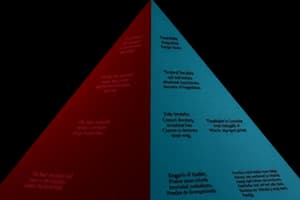Podcast
Questions and Answers
What is the purpose of Freytag's pyramid in storytelling?
What is the purpose of Freytag's pyramid in storytelling?
- To analyze the setting of the story
- To define the theme of the story
- To illustrate character development
- To outline the structure of a narrative (correct)
The climax of a story is typically the final part where everything is resolved.
The climax of a story is typically the final part where everything is resolved.
False (B)
What are the four main points of Freytag's pyramid?
What are the four main points of Freytag's pyramid?
Exposition, rising action, climax, falling action, resolution.
In first-person point of view, the narrator uses the pronoun ______ to tell the story.
In first-person point of view, the narrator uses the pronoun ______ to tell the story.
Match the following points of view with their descriptions:
Match the following points of view with their descriptions:
How does the exposition in Freytag's pyramid set the stage for a narrative?
How does the exposition in Freytag's pyramid set the stage for a narrative?
What impact does the choice of a third person omniscient POV have on a story?
What impact does the choice of a third person omniscient POV have on a story?
In what way does the resolution in Freytag's pyramid differ from the climax?
In what way does the resolution in Freytag's pyramid differ from the climax?
How does third person limited POV influence a reader's connection to a protagonist?
How does third person limited POV influence a reader's connection to a protagonist?
What role does rising action play in Freytag's pyramid?
What role does rising action play in Freytag's pyramid?
Flashcards are hidden until you start studying
Study Notes
Freytag's Pyramid
- Freytag's Pyramid is a structure for analyzing plot in narrative works, created by Gustav Freytag in the 19th century.
- It consists of five key elements: exposition, rising action, climax, falling action, and denouement.
- Exposition introduces characters, setting, and basic conflict, setting the stage for the story.
- Rising Action involves a series of events that create tension and develop the conflict, leading up to the climax.
- Climax is the turning point or the most intense moment in the story, where the main conflict reaches its peak.
- Falling Action follows the climax and explores the consequences of the climax, leading towards resolution.
- Denouement is the conclusion where the story’s conflicts are resolved and any remaining secrets or subplots are unveiled.
Point of View (POV) in Writing
- Point of view in writing determines the angle and perspective from which a story is told.
- First Person POV uses "I" or "we" and presents the story through the narrator's personal experiences and thoughts, allowing for deep insight into the character's emotions.
- Third Person Limited POV utilizes "he," "she," or "they," focusing on the thoughts and feelings of one character while keeping other characters' perspectives hidden.
- Third Person Omniscient POV also uses "he," "she," or "they" but allows the narrator to access the thoughts and feelings of all characters, providing a broader understanding of the narrative.
- Understanding POV enhances the reader's connection to characters and can dramatically affect the storytelling experience.
Studying That Suits You
Use AI to generate personalized quizzes and flashcards to suit your learning preferences.




